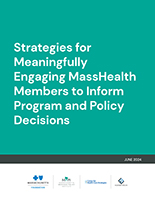The Blue Cross Blue Shield of Massachusetts Foundation today announced $250,000 in grant funding to support five community-based projects with strong potential to be scaled to improve access to care while advancing healthy equity.
In addition to funding its major grantmaking programs, the Foundation regularly awards Special Initiatives grants that respond to needs identified by grantees and their communities. The projects aim to positively impact health or health care access for Massachusetts residents who have been economically, socially, culturally or racially marginalized.
The Board of Directors recently approved one-year, $50,000 grants to each of the following nonprofit organizations and their projects:
Community Servings, based in Jamaica Plain, will pilot a “step-down program” for clients who have received medically tailored meals but have become well enough to transition away from home-delivery service. The program will provide a pathway to address food and nutrition insecurity.
The step-down program, starting with 75 individuals, will provide medically tailored food boxes, a cookbook with simple recipes, cooking demonstration videos, nutrition education, and support from a registered dietitian nutritionist. Community Servings plans to expand this Food is Medicine intervention to as many as 500 clients annually with support from health care contracts and philanthropy.
Luminosity Behavioral Health Services, located in Brockton, will develop a more responsive behavioral health model in communities of color throughout southeastern Massachusetts. As the co-convenor and fiscal agent for the South East Multicultural Providers Association (SEMPA), Luminosity and its collaborative partners are aiming to end the “scavenger hunt” for supportive, culturally sensitive therapeutic interventions that exist in the region.
SEMPA members will implement cross-agency agreements to address the availability of services, youth advocacy and referrals. The goal is to train and certify 60 staff members in applying trauma-specific interventions, create a standardized referral process and policies to reduce long waitlists across the participating organizations, and increase the pool of multicultural health professionals and youth mentors serving the needs of Brockton families.
Martha’s Vineyard Community Services, based in Oak Bluffs, will create a co-responder pilot program to address the lack of behavioral health care access for island residents, who typically engage with mental health and substance use services only through 911 calls to police. There is often an inequity in accessing services by racial and ethnic communities for various reasons, including stigma.
The new program would link a qualified behavioral health clinician with local law enforcement to create a pathway to community-based services, diverting residents from detainment, arrest or transport to the hospital emergency department. The organization plans to train up to 10 clinicians, develop an emergency response schedule with law enforcement, and embed clinicians in the island’s six towns.
Prisoners’ Legal Services, a statewide organization headquartered in Boston, will develop a project to increase access to medical parole by creating an infrastructure for pro bono attorneys and medical advocates to collaborate on prisoner petitions. Prisons are not equipped to handle the health care needs of seriously ill or dying prisoners, and medical parole is seen as the best alternative.
Since medical parole became possible in 2018, less than 12% of the 587 petitions have been granted – leaving individuals to die or languish in prison even though their health needs could be met in the community with far less burden on the public. To increase support for eligible incarcerated individuals, the nonprofit will identify and train pro bono attorneys who can respond to referrals, forge connections between the attorneys and pro bono medical providers, and develop resource materials and communications to family members.
Walker Inc., headquartered in Needham, will conduct a feasibility study for a therapeutic preschool model and develop an effective intervention for the growing number of preschool-age children with challenging behaviors who are at risk of suspension or expulsion from early education and care programs in the Dorchester, Jamaica Plain and Roxbury neighborhoods of Boston.
Preschoolers are suspended and expelled at three times the rate of children in grades K-12, according to the U.S. Department of Education. Black children make up a disproportionate number, and preschool-age boys are much more likely than girls to be removed from school. Research shows this can adversely influence developmental, health and education outcomes. Walker Inc. will research the issue, outline a sustainable funding model, and prepare to launch a pilot preschool program.
“These five projects demonstrate novel approaches by community-based organizations aimed at solving a number of systemic challenges that limit health care access,” said Audrey Shelto, President and CEO of the Blue Cross Blue Shield of Massachusetts Foundation. “Our grantmaking team looks forward to supporting their progress and helping them achieve significant outcomes that improve health equity and eventually reach well beyond the initial scope of the pilot and research phases.”
About the Blue Cross Blue Shield of Massachusetts Foundation
The mission of the Blue Cross Blue Shield of Massachusetts Foundation is to ensure equitable access to health care for all those in the Commonwealth who are economically, racially, culturally or socially marginalized. The Foundation was established in 2001 with an initial endowment from Blue Cross Blue Shield of Massachusetts. It operates separately from the company and is governed by its own Board of Directors. For more information, visit www.bluecrossmafoundation.org.









